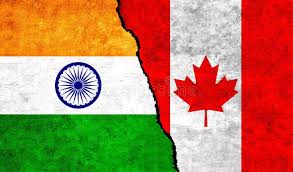The recent diplomatic tensions between Canada and India have created ripples that extend far beyond political discourse, significantly affecting international students from India pursuing education in Canada. The Canadian government’s new immigration policies, combined with the current diplomatic row, are set to not only deter prospective Indian students but also impose substantial economic consequences on Canada’s post-secondary education sector. As international enrolments dwindle, it is essential to understand how these changes will impact both nations, particularly focusing on the Indian students who have historically been a vital part of Canada’s educational landscape.
Diplomatic Context and its Ramifications
The diplomatic strains between Canada and India have emerged amidst allegations of interference and the assassination of an Indian separatist leader in Canada. This situation has escalated to the point where both countries have issued travel advisories, and tensions are manifesting in various sectors, including education. As the relationship deteriorates, many Indian students may reconsider their decisions to study in Canada, fearing for their safety and the long-term implications of such geopolitical issues.
A Shift in Student Perceptions
Indian students represent the largest group of international learners in Canada, with significant financial contributions to the education sector. However, the current diplomatic climate has led to uncertainty. Indian students now face a complex decision-making process regarding their education abroad. Many prospective students are exploring alternative destinations, such as Australia, the UK, and the US, where they may feel more welcomed and secure. This shift in perception is likely to lead to a substantial decline in the number of Indian students applying for study permits in Canada.
New Immigration Policies and Their Consequences
In addition to diplomatic tensions, Canada has introduced a series of immigration policies aimed at reducing the number of international students. The most significant changes include a federally mandated cap on foreign enrolments, resulting in a projected 35% reduction in new study permits for 2024, followed by a further 10% cut in 2025. These restrictions will not only deter prospective students but also adversely affect the financial viability of Canadian universities, particularly in Ontario.
Financial Impact on Canadian Education
Ontario is expected to bear the brunt of these policy changes, facing an estimated loss of nearly CDN$1 billion over the next two years. Institutions in Ontario, which already receive the lowest funding in the country, heavily depend on international tuition fees. As the number of Indian students declines, the financial strain on these institutions will exacerbate, leading to potential cuts in programs and services that directly benefit students. The loss of international students will also impact local economies, as many businesses rely on the patronage of these students.
The Role of Indian Students in Canada
Indian students have historically played a crucial role in Canada’s post-secondary education system. In 2022 alone, there was a 47% increase in study permit holders from India, contributing significantly to the financial health of Canadian universities. However, this trend is reversing, with a notable decline in the number of Indian students applying for study permits in recent months. As of August 2024, there were only 137,445 new study permits issued to Indian students, representing a 4% decrease compared to 2023.
Economic Contributions at Risk
The economic contribution of international students cannot be understated. In 2022, international students contributed an estimated CDN$30.9 billion to Canada’s GDP. This influx of revenue has been a boon for Canadian universities, which rely on the financial support that international students provide. However, with the combined effects of the new immigration policies and deteriorating diplomatic relations, Canada risks losing not only significant revenue but also its reputation as a premier destination for international education.
Moving Forward: Opportunities for India
Despite the challenges posed by the current diplomatic situation, Indian students and educational institutions can explore several opportunities.
Alternative Study Destinations
As the Canadian education system becomes increasingly inaccessible, students may look to other countries with welcoming immigration policies and robust educational systems. Nations such as Australia, the UK, and Germany offer appealing alternatives that can accommodate the needs of Indian students seeking quality education abroad.
Strengthening Academic Ties
In response to these challenges, Indian educational institutions could strengthen their partnerships with universities in other countries. By fostering international collaborations, Indian institutions can enhance their offerings, attract foreign students, and create more opportunities for Indian students to study abroad. The diplomatic rift between Canada and India, coupled with new immigration policies, presents a complex landscape for Indian students aspiring to study in Canada. As enrolments decline, the implications for both countries extend beyond education to encompass economic impacts and the potential reallocation of students to alternative destinations. Moving forward, it is essential for both nations to engage in dialogue that fosters mutual understanding and cooperation, ensuring that the valuable contributions of Indian students to Canada’s education system are not lost amidst geopolitical tensions.




